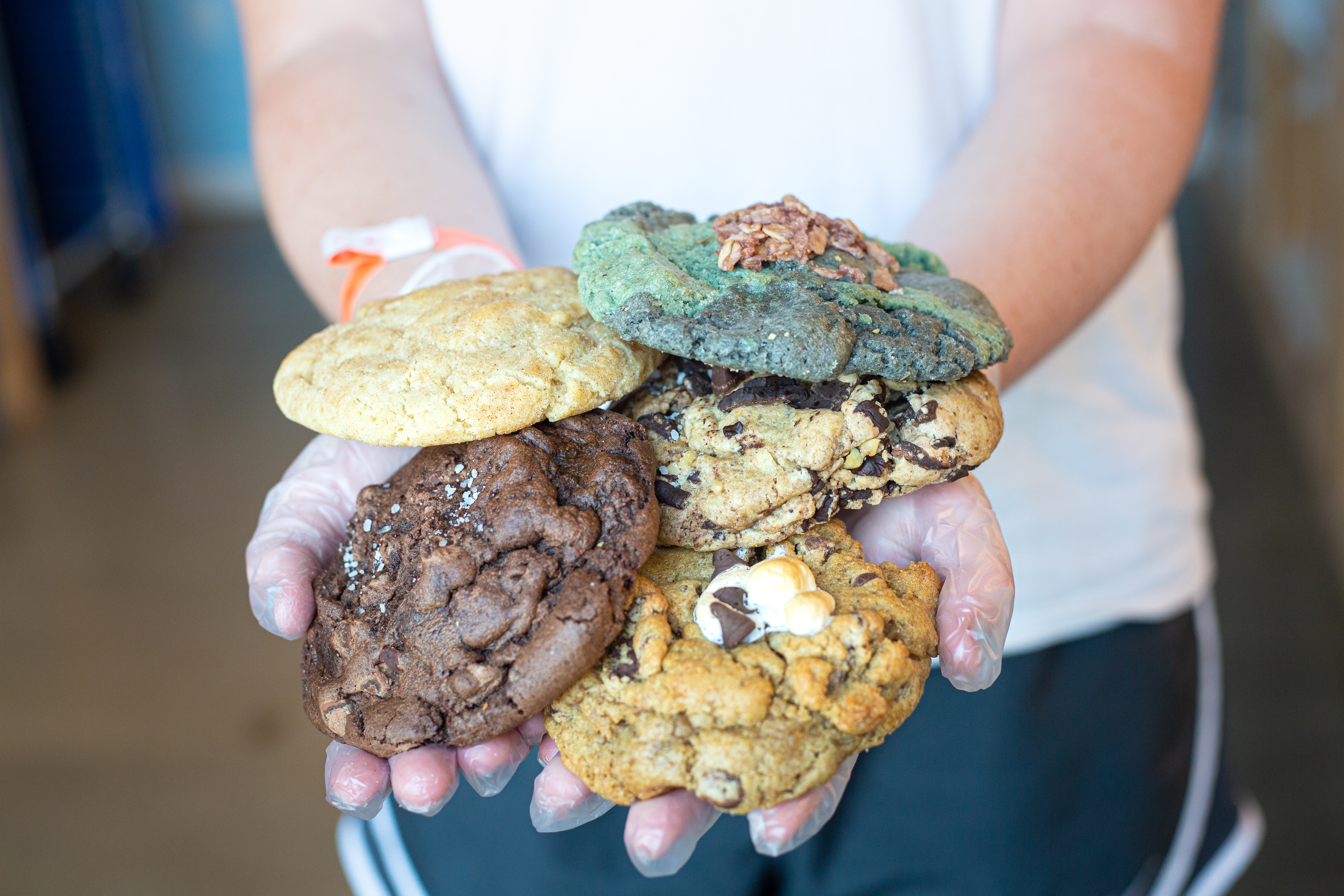You shouldn't feed cookies to your cat, as they contain ingredients that are potentially harmful. Chocolate can cause severe health issues like vomiting, diarrhea, and seizures due to theobromine toxicity. High sugar content and artificial sweeteners such as xylitol can lead to digestive distress, obesity, and diabetes. Additionally, certain ingredients like raisins and macadamia nuts are toxic and can cause kidney failure. Cats need a diet rich in animal-based proteins and essential nutrients, which cookies lack. Opting for healthier alternatives, such as high-protein cat treats or homemade options, guarantees your feline friend stays healthy and well-nourished. Learn more about safe treat choices next.
Key Takeaways
- Cookies contain ingredients like chocolate and raisins that are toxic and harmful to cats.
- High sugar content in cookies can lead to obesity, diabetes, and digestive issues in cats.
- Artificial sweeteners such as xylitol in cookies can cause severe health problems, including potential liver failure in cats.
- Cookies lack essential nutrients like taurine, which are necessary for a cat's health and well-being.
- Feeding cats cookies can disrupt their balanced diet, leading to nutritional deficiencies and health risks.
Are Cookies Safe for Cats?
When considering if cookies are safe for your cat, you need to examine their ingredients and potential toxicity. Many cookies contain chocolate, raisins, or artificial sweeteners like xylitol, which are harmful to cats. Additionally, the high sugar and fat content make cookies nutritionally unsuitable for feline diets.
Ingredients and Toxicity
To understand whether cookies are safe for cats, it's important to examine their ingredients and potential toxicity. Many common cookie ingredients can cause adverse effects in cats.
Here are four key concerns:
- Chocolate Chip Cookies: Chocolate contains theobromine, which is highly toxic to cats, leading to severe health issues.
- Excessive Sugar: High sugar content in cookies can result in digestive issues and contribute to obesity and diabetes in cats.
- Artificial Sweeteners: Ingredients like xylitol can cause considerable gastrointestinal issues and even liver failure in felines.
- Raisins and Nuts: Certain cookies contain raisins or macadamia nuts, both of which are toxic to cats and can cause kidney failure or other serious health problems.
Even if a cookie doesn't contain obviously toxic ingredients, the excessive sugar and fat can still cause stomach upset and other digestive issues. Cats require balanced diets that cater to their specific nutritional needs, and cookies don't align with these requirements. Offering cookies to your cat can lead to various health issues, including obesity and diabetes, due to their inappropriate nutrient composition. Always prioritize your cat's health by avoiding foods that can have toxic effects and opting for feline-appropriate treats.
Nutritional Unsuitability
Given their nutritional needs, cookies are far from suitable for cats. Cats have specific nutritional requirements, such as a high demand for animal-based protein and essential nutrients like taurine, which are not present in cookies. The high sugar content in cookies can lead to an upset stomach and possible abdominal pain in your feline friends. Over time, consuming sugary foods can contribute to obesity in cats, which brings its own set of health problems, including diabetes and joint issues.
Unlike commercial cat food, which is formulated to provide a balanced diet, cookies lack the proper nutrients that cats need to thrive. Cookies are designed for human consumption and don't meet the dietary needs of cats. Feeding your cat cookies can disrupt their nutritional balance, leading to deficiencies in essential nutrients.
Cats rely on a diet primarily composed of animal-based protein to maintain muscle mass and overall health. By giving them cookies instead of their regular cat food, you risk compromising their health. It's always best to stick to commercial cat food specifically designed to meet your cat's needs and avoid human treats that can cause harm.

Choose Your Own Delightfully Perfect Cookies.
With almost 30 flavors to choose from, you can make your box as unique as you are.
Risks of Feeding Cookies to Cats
Feeding cookies to your cat can lead to serious health concerns, including obesity, diabetes, and digestive issues due to high sugar and fat content. Additionally, certain ingredients like chocolate and raisins are toxic to cats and can pose physical hazards, such as choking or poisoning. It's essential to understand these risks before sharing any human treats with your feline friend.
Health Concerns
It's crucial to understand the health risks associated with feeding cookies to cats. Cats' digestive systems are not designed to handle many of the ingredients found in cookies, and this can lead to serious health issues.
Here are four specific concerns to keep in mind:
- Chocolate Poisoning: Chocolate, particularly baking chocolate, contains theobromine, which is toxic to cats. Symptoms of chocolate poisoning include vomiting, diarrhea, rapid breathing, and seizures.
- High Amounts of Sugar: Cookies often contain high amounts of sugar, which can contribute to cat obesity and diabetes. Unlike cat-specific treats, cookies are not formulated with a cat's nutritional needs in mind.
- Kidney Failure: Ingredients such as raisins and certain artificial sweeteners can lead to kidney failure in cats. Even small cat-sized pieces of these harmful ingredients can be dangerous.
- Unbalanced Diet: Feeding your cat cookies can lead to an unbalanced diet, as these treats do not provide the nutrients found in regular food. An excess of non-nutritive treats can displace the amount of tuna or other protein-rich foods necessary for your cat's health.
To guarantee your feline friend stays healthy, stick to cat-specific treats and avoid giving them human foods like cookies.
Physical Hazards
While cookies may seem like harmless treats, they pose considerable physical hazards to cats. One major risk is the type of chocolate ingested, especially in chocolate chip cookies, which can be toxic to cats. Even a small amount can lead to cardiovascular issues, causing severe health problems. Additionally, the wheat flour found in many cookies can trigger allergic reactions, leading to gastrointestinal distress.
Beyond ingredients, the texture and size of cookies present choking hazards. Cats may struggle to chew bite-size pieces, which can cause breathing issues if they get lodged in the throat. Storing cookies in an airtight container isn't just to keep them fresh; it can prevent curious cats from accessing them and facing such dangers.
Moreover, some cookies might contain ingredients from the allium family, like onions or garlic, which are highly toxic to felines. Spicy food remnants in cookies can also irritate a cat's digestive system, leading to vomiting or diarrhea. All these factors highlight the importance of keeping cookies, regardless of their type, well out of your cat's reach to guarantee their safety and well-being.
Healthier Alternatives for Cats
Instead of giving your cat cookies, you should consider cat-specific treats that cater to their nutritional needs and taste preferences. These treats are formulated to be safe and enjoyable for cats, ensuring they get the right nutrients without any harmful ingredients. Additionally, you can prepare safe homemade options using ingredients like cooked chicken or fish, which are both healthy and delicious for your feline friend.
Cat-Specific Treats
When treating your feline friend, you don't have to rely on traditional cat treats that may be loaded with unhealthy ingredients. Opting for healthier, cat-specific treats can better support your pet's well-being and align with their feline diet.
Here are some excellent choices for healthier alternatives:
-
Dried or Dehydrated Treats: These treats often contain high levels of animal protein, which is essential for a cat's diet. They're typically free from additives and preservatives, making them a cat-friendly treat.
-
Homemade Treats: You can prepare homemade treats using simple ingredients like chicken, fish, or turkey. These treats allow you to control quality and ingredients, ensuring they're safe and nutritious for your cat.
-
Catnip-Infused Treats: Many cats enjoy catnip, and treats infused with this herb can provide enrichment and stimulation. These can be given as an occasional treat to add variety to their daily diet.
-
High-Quality Commercial Cat Food: Some pet parents may offer a small portion of high-quality wet or dry cat food as a treat. This can be a healthier option, ensuring the treat fits seamlessly into their balanced diet.
Safe Homemade Options
Treating your cat with homemade options is not only rewarding but also guarantees you know exactly what goes into their snacks. Safe homemade options can be crafted with ingredients that are beneficial and enjoyable for your feline friend. For instance, gingerbread recipes tailored for cats can be a delightful treat. Instead of giving them a regular bite of gingerbread, you can make a cat-friendly version using oat flour.
Start with two cups of oat flour as a base. Combine this with small amounts of tuna for flavor and nutrition. Vanilla yogurt can be used sparingly to bind the mixture and add a slight sweetness without the harmful sugars found in regular cookies.
When considering baking time, keep it short to make certain the treats remain soft and easy for adult cats to chew, especially if they are used to dry food. This way, you can avoid hard textures that might be difficult for them to eat. Always monitor the amounts of each ingredient to avoid overfeeding, as cats require specific portion sizes to maintain their health. By making these adjustments, you make certain that your cat enjoys safe, homemade treats tailored to their dietary needs.
Frequently Asked Questions
How Much Sugar Is Too Much for Cats?
You shouldn't give your cat any sugar. Cats lack the necessary enzymes to digest sugar properly, and even small amounts can lead to obesity, diabetes, and other health issues. Always prioritize your cat's health over treats.
Can Cookies Cause Allergies in Cats?
Yes, cookies can cause allergies in cats. You'll notice symptoms like itching, vomiting, or diarrhea if your cat's allergic. Always check ingredients and consult your vet before offering any human food to your feline friend.
Do Certain Cookie Ingredients Appeal to Cats?
Some cookie ingredients might appeal to cats, like butter or milk. However, you should avoid sharing cookies with them. Cats can't process certain ingredients, and even small amounts could cause health issues or digestive problems.
What Should I Do if My Cat Eats a Cookie?
If your cat eats a cookie, don't panic. Remove any remaining pieces, monitor for symptoms like vomiting or diarrhea, and contact your vet for advice. Keep all human treats out of reach to prevent future incidents.
Are There Any Cat-Safe Cookie Recipes?
You can find cat-safe cookie recipes online that use ingredients like tuna, chicken, or pumpkin. Just guarantee you avoid harmful ingredients like chocolate, sugar, and certain spices. Your cat will appreciate a tasty, safe treat!
Conclusion
To summarize, it's clear that cookies aren't safe or nutritionally suitable for cats due to harmful ingredients and potential health risks. You should avoid giving your feline friend cookies to prevent physical hazards and health concerns. Instead, opt for cat-specific treats or safe homemade options that cater to their dietary needs. By making informed choices, you can guarantee your cat remains healthy and happy without compromising their well-being. Always prioritize your cat's health when selecting treats.








